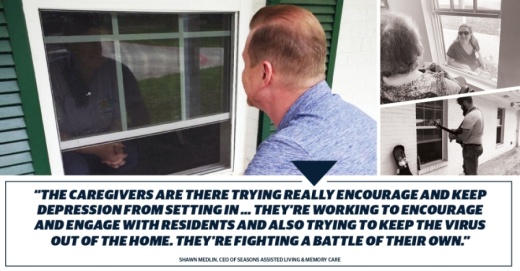Three years ago, Fetters said she moved her elderly mother to an assisted living center in Huntsville with the promise that she would visit at least one day per week. Regardless of her schedule, Fetter said she has kept her word.
And then the coronavirus happened.
On March 19, Gov. Greg Abbott issued an executive order that banned all visits to nursing homes and senior living centers, except for critical assistance or end-of-life visitation, and Fetter’s visits came to a halt. Now, Fetters said she stays in touch with her mother virtually.
“It’s been hard not getting to see her and hug her, but with the coronavirus running rampant, we know that it’s best,” she said. “[Video chatting has] kept her from feeling lonely and isolated.”
Older adults and those with compromised immune systems are particularly susceptible to coronavirus, according to the Centers for Diseases and Prevention, and state and county orders to limit the spread have targeted communal senior living facilities. Of the 197 confirmed coronavirus cases in Montgomery County as of April 7, 56 individuals—about 30%—were older than 60, according to the Montgomery County Public Health District.

As of April 7, all four of the county’s coronavirus deaths were individuals over the age of 80.
Three of those deaths came from The Conservatory at Alden Bridge, a luxury retirement community in The Woodlands. On March 30, County Judge Mark Keough ordered an immediate shelter-in-place for the community—10 days after the initial diagnosis of the community's first coronavirus case.
By that time, another resident had tested positive, and one day after the order was enacted, a third case was confirmed.
'A quiet war'
Those tasked with caring for the county’s seniors said they take precautions against the virus seriously, and caregivers are operating with a heightened focus on cleanliness and safety. On top of the usual tasks—pill management, running errands and keeping seniors company—they are now wearing masks or checking in on clients virtually when in-person visits are not allowed.
Shehnaz Kapasi, franchisee for Seniors Helping Seniors in the Greater Houston area, said she is proud of how her caregivers, many who are themselves senior citizens, have adapted to the tighter regulations. They follow a strict cleaning protocol, check if clients exhibit telltale symptoms and do frequent phone calls.
“They are the unsung heroes,” she said. “It’s a very quiet war.”
Some local facilities began preparing for the outbreak even before state and county mandates rolled in.
Sandi Heintz, franchisee for Right at Home, an in-home care company that serves about 30 homes in Montgomery County and 40 in Tomball in its northwest Houston location, said she closely watched news of the pandemic when it had not yet made landfall in the U.S. Then the virus hit a nursing home in Washington state, and Heintz said she knew she had to act.
By the time the first coronavirus case surfaced in Texas, Heintz had already begun reaching out to families, letting them know her company would limit caretakers from entering both homes and assisted/independent living facilities to prevent cross contamination.
Heintz recounted how caregivers communicated to a client that they would begin delivering pill packs through the pharmacy rather than in-person visits, even prior to when the facility closed visitations. And companywide, the franchise began implementing stricter cleaning regiments, she said.
“We already had an infection control policy procedure, ... but we took that extra step earlier on,” Heintz said. “All of our families have been very thankful that we contacted then early and that we told them what we’re doing.”
Virtual connections
“It’s different.”
Those are the words Kapasi used when describing how Seniors for Seniors was operating in the wake of coronavirus. Kapasi said she believes Seniors for Seniors has always followed high cleaning standards, but it is now doubling down on efforts.
The caregivers themselves are usually seniors—one of her oldest is 78 years old—so they need to watch out for themselves as well, Kapasi said. Still, caregivers are making phone calls and staying in touch virtually with clients, she said.
Shawn Medlin, CEO of Seasons Assisted Living & Memory Care in Conroe, said his caregivers are also doing their best amid trying times.
“The caregivers are there trying really encourage and keep depression from setting in and doing activities,” Medlin said. “They’re working to encourage and engage with residents and also trying to keep the virus out of the home. They’re fighting a battle of their own.”
Medlin said it is his job to ensure his facility follows Texas Health and Human Services and CDC guidelines, which change almost daily. Medlin has suspended nonessential visitations and encourages everyone to wear masks.
“If someone has elevated temperature, we don’t let them in,” he said. “If it’s a staff member, we require them to quarantine and get tested. ... If something does pop up, we need to immediately report it.”
He does, however, permit window-side visits, and loved ones now play instruments outside windows or pop in remotely via video chats.
Longer-term outcomes
Lisa Hayes, managing local ombudsmen for several Houston-area counties, and Jacqui Johnson, staff ombudsman for Montgomery County, said they have also had to adapt their daily routines. As ombudsmen, Hayes and Johnson advocate for elderly rights, which could range from welfare concerns and negligence to food complaints. These conversations now take place virtually or over the phone.
But Hayes said she thinks several positives could come from coronavirus. For one, nursing homes and assisted living facilities are getting continuous new training, rules, guidance and even specialized inspections on infection control “unlike ever before,” she said.
"I hope a positive that could come from this is a better-informed workforce and future stronger rules on infection control for other communicable diseases commonly seen in facilities,” she said.
There may also be an increased value in health care workers; most certified nursing assistants make between $10-$17 per hour, Hayes said.
“Many facilities are paying staff more to encourage them to work,” she said. “We know a higher valued workforce leads to a higher quality workforce.”
In the nearer term, there is still the question of how senior living and long-term care facilities will secure limited supply such as personal protective equipment. Johnson said she has not had any complaints from nursing homes and assisted living centers in Montgomery County regarding dwindling PPE, but Hayes said she is not certain if suppliers will be able to continue meeting increased demand.
“We’ll have to see how that goes in the next few weeks,” she said.
Right at Home corporate, for example, has been able to secure large batches of PPE and is in the process of distributing it to franchises, but it is still in need of more eye protection and masks, Heintz said.
“We have fabric masks. They’re just not as protective when you’re working face to face with a client that might have the virus,” she said. “We currently are not servicing anybody with the virus, but we know that’s probably going to change. It’s just a a matter of time.”





